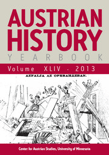
Austrian History Yearbook
metrics 2024
Unveiling Insights into Austria's Rich Legacy
Introduction
Austrian History Yearbook is a leading academic journal published by Cambridge University Press, focusing on the rich tapestry of Austrian history and its intersections with broader European narratives. With its ISSN 0067-2378 and E-ISSN 1558-5255, the journal has carved a niche within the academic landscape since its inception, offering insightful research and analysis that spans various periods and themes in Austrian history. Rated in the Q2 category for History in 2023, and boasting a respectable Scopus rank of #564 out of 1760 within the Arts and Humanities field, the Austrian History Yearbook stands out as a vital resource for historians, researchers, and students alike. The journal aims to promote scholarly discourse, foster critical engagement with historical texts, and contribute significantly to the historiography of Austria and its role in European history. With access options providing a gateway to an extensive repository of scholarly works, the journal serves as an essential platform for advances in historical research, making it indispensable for a global audience keen on understanding the complexities of Austrian heritage.
Metrics 2024
 0.14
0.14 0.30
0.30 0.30
0.30 11
11Metrics History
Rank 2024
Scopus
IF (Web Of Science)
JCI (Web Of Science)
Quartile History
Similar Journals

Quaestio Rossica
Advancing Interdisciplinary Dialogue in the HumanitiesQuaestio Rossica is a prestigious academic journal published by URAL FEDERAL UNIVERSITY that focuses on a broad spectrum of the humanities, encompassing cultural studies, history, linguistics, literature and literary theory, as well as visual and performing arts. With an Open Access model since 2021, it provides unrestricted access to high-quality research articles, fostering a more inclusive platform for scholarly discourse. The journal has notably achieved Q1 rankings in key categories such as Cultural Studies and Literature and Literary Theory, highlighting its impact and relevance. With a commitment to advancing interdisciplinary dialogue, Quaestio Rossica serves as an essential resource for researchers, professionals, and students interested in exploring the rich complexities of human culture and expression. Based in the Russian Federation, it aims to bridge gaps in knowledge across various linguistic and cultural contexts, making its contribution invaluable in today's increasingly globalized academic landscape.

Comparative Southeast European Studies
Innovating Research for a Deeper Understanding of Southeast EuropeComparative Southeast European Studies, published by WALTER DE GRUYTER GMBH, is an esteemed open-access journal that has been contributing to scholarly discourse since its inception in 2021. With its ISSN 2701-8199 and E-ISSN 2701-8202, the journal is dedicated to the multidisciplinary examination of Southeast European societies, cultures, and economies. The journal strives to foster a nuanced understanding of historical and contemporary issues through an array of perspectives, appealing to researchers, professionals, and students alike. While it currently resides in Q4 for several categories including Anthropology, Economics, and Political Science, it maintains a robust platform for innovative research and dialogue within the region. Situated in Germany, this journal serves not only as a repository of knowledge but also as a catalyst for future scholarly endeavors, with the aim to elevate the discourse surrounding Southeast Europe during the converging years of 2021 to 2024. Its commitment to open access ensures that critical research is readily available, inspiring collaboration and engagement across academic and professional communities.
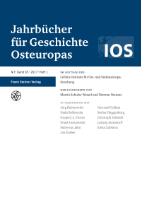
JAHRBUCHER FUR GESCHICHTE OSTEUROPAS
Connecting the Dots of Eastern Europe's Historical LandscapeJAHRBUCHER FUR GESCHICHTE OSTEUROPAS, published by FRANZ STEINER VERLAG GMBH, is a prominent academic journal dedicated to the exploration of Eastern European history. With its inception dating back to 1978, this journal has consistently provided a platform for scholarly discourse, contributing significantly to the understanding of the region's complex historical narratives. While the journal is not open access, it holds a solid reputation within the academic community, positioned in the Q4 quartile in history as per the 2023 category rankings, and stands at Rank #1636 within the Scopus Arts and Humanities History ranking. The convergence of its publication years throughout the decades emphasizes a long-standing commitment to historical research, thereby making it an essential resource for researchers, professionals, and students interested in Eastern European studies. Explore the intricate dynamics of historical events and cultural developments that shape Eastern Europe through this invaluable periodical.
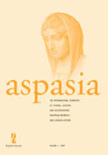
Aspasia
Charting new territories in gender and historical research.Aspasia is a distinguished open-access journal dedicated to the fields of Gender Studies and History, published by BERGHAHN JOURNALS and based in the United Kingdom. Since its inaugural issue in 2011 and achieving open access in 2019, Aspasia has committed to providing a platform that explores diverse scholarly perspectives on women's experiences and gender dynamics within historical contexts. With an impact factor reflective of its rigorous peer-review process, Aspasia has achieved notable rankings, including Q4 in Gender Studies and Q3 in History for 2023, indicating its growing influence within these disciplines. The journal is indexed in prominent databases, showcasing its relevance and contribution to ongoing academic discourse. Researchers, professionals, and students are encouraged to explore its rich content, fostering critical dialogue and advancing knowledge in the understanding of gender and historical narratives.

Journal of Early Modern History
Charting New Territories in Early Modern HistoryJournal of Early Modern History, published by BRILL, is a premier academic journal dedicated to the exploration and analysis of early modern history, encompassing a broad range of interdisciplinary studies from 1450 to 1800. With an ISSN of 1385-3783 and an E-ISSN of 1570-0658, this journal serves a global community of historians, researchers, and students, providing an invaluable platform for the dissemination of new research and scholarly dialogue. The journal, which is based in the Netherlands, boasts a solid Scopus rank of #536 out of 1760 in the Arts and Humanities - History category, placing it in the 69th percentile, and it holds a respectable Q3 quartile ranking as of 2023. The objectives of the journal include fostering innovative historical scholarship and engaging with the methodological challenges of the field, making it an essential resource for those dedicated to the study of early modernity. Although it is available through conventional subscription models, its impact on the historiographical landscape is significant, paving the way for future research and critical discourse in a vital period of history.
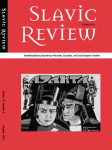
SLAVIC REVIEW
Illuminating the Tapestry of Slavic Heritage.SLAVIC REVIEW, published by Cambridge University Press, is a prominent academic journal that delves into the rich tapestry of Slavic studies, focusing on the cultural, historical, and social dimensions of Slavic regions. With an ISSN of 0037-6779 and an E-ISSN of 2325-7784, this journal holds a significant position within the academic community, ranking in the Q2 category of Arts and Humanities (miscellaneous) and achieving a Q1 rating in Cultural Studies as of 2023. Notably, the journal has consistent relevance in the field, as evidenced by its Scopus rankings—Rank #260 in Cultural Studies and Rank #204 in Miscellaneous Arts and Humanities. Since its converged years starting from 1966 up to the present, SLAVIC REVIEW has been an essential resource for researchers, professionals, and students aiming to deepen their understanding of Slavic cultures. While it operates on a traditional subscription model and does not provide open access, the journal remains a vital platform for pioneering research and critical discourse in Slavic studies.
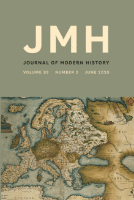
JOURNAL OF MODERN HISTORY
Pioneering Research in Contemporary Historical AnalysisJOURNAL OF MODERN HISTORY is a premier academic publication specializing in the field of History, published by the University of Chicago Press. With an esteemed Q2 category ranking in the 2023 history quartiles, this journal serves as a pivotal platform for scholarly discourse that examines modern historical events and their impact on contemporary society. The journal has established a solid reputation, evidenced by its Scopus rank of #272 out of 1760 in Arts and Humanities, placing it in the 84th percentile. With a rich history dating back to its inception in 1975, it continues to provide researchers, professionals, and students with access to rigorous peer-reviewed articles that push the boundaries of historical understanding. While it does not offer open access, the journal treasures the depth of scholarship offered through its meticulously curated content, making it an essential resource for anyone seeking to navigate the complexities of modern history.
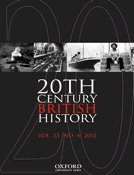
Twentieth Century British History
Illuminating Britain's past for a brighter future.Twentieth Century British History, published by Oxford University Press, stands as a pivotal scholarly journal in the field of historical research, specializing in the rich tapestry of British history during the twentieth century. With an esteemed impact factor and a notable position within the top Q1 quartile of history journals, it ranks impressively in the Scopus database, securing the 234th position out of 1,760 journals in Arts and Humanities, placing it in the 86th percentile. This rigorous academic platform, active since its establishment in 1990, not only contributes to the sophistication of historical discourse but also encourages interdisciplinary dialogue among historians, sociologists, and cultural studies scholars. Though it does not currently offer open access options, the journal provides invaluable insights, critical analyses, and innovative perspectives aimed at enriching the understanding of Britain’s past and its implications for contemporary society. Researchers, professionals, and students alike will find Twentieth Century British History an essential resource for exploring and appreciating the complexities of modern history.
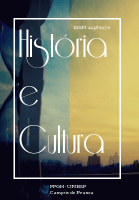
Historia e Cultura
Innovating Historical Discourse for a Global AudienceHistoria e Cultura is a distinguished open-access journal focusing on the dynamic and multifaceted exploration of history and culture within the context of the Humanities. Published by the UNIV ESTADUAL PAULISTA JULIO MESQUITA FILHO, FAC CIENCIAS HUMANAS & SOCIAIS, the journal serves as a vital resource for researchers, professionals, and students engaged in the fields of historical research and cultural studies. Since transitioning to open access in 2012, Historia e Cultura aims to democratize knowledge by providing free, unrestricted access to high-quality articles that foster scholarly exchange and innovation. Although the specific impact factor remains undisclosed, the journal is dedicated to contributing to the academic discourse through rigorous peer-reviewed research. Situated in Brazil, Historia e Cultura is well-positioned to address both local and global issues, encouraging critical engagement with cultural heritage and identity. Researchers and scholars are invited to submit their work, ensuring that diverse perspectives are represented in the study of our shared history.

Studia Austriaca
Exploring the Depths of Austrian Culture and LiteratureStudia Austriaca, published by Milano University Press, is a distinguished open-access journal that has been promoting scholarly discourse in the realms of Cultural Studies and Literature since its inception in 1992. Based in Italy, this journal aims to serve as a vital platform for researchers, professionals, and students seeking to explore the complexities of Austrian culture and its literary contributions. With ISSN 1593-2508 for print and E-ISSN 2385-2925 for online access, Studia Austriaca offers a comprehensive repository of articles that reflect a dynamic understanding of cultural interactions. Although its current Scopus rankings place it in the lower percentiles of the Arts and Humanities categories, the journal's commitment to maintaining high academic standards and facilitating open access ensures that it remains an essential reference for academic inquiry. The journal's coverage is set to continue evolving, with converged years extending from 2017 to 2024, thus paving the way for emerging discussions and research developments in the fields of literature and cultural studies.